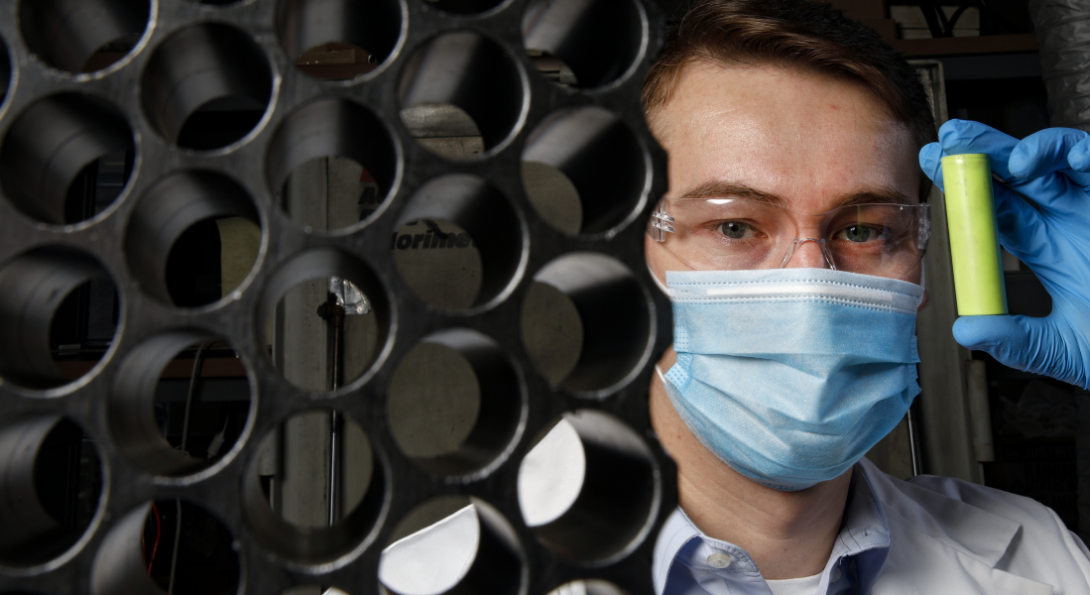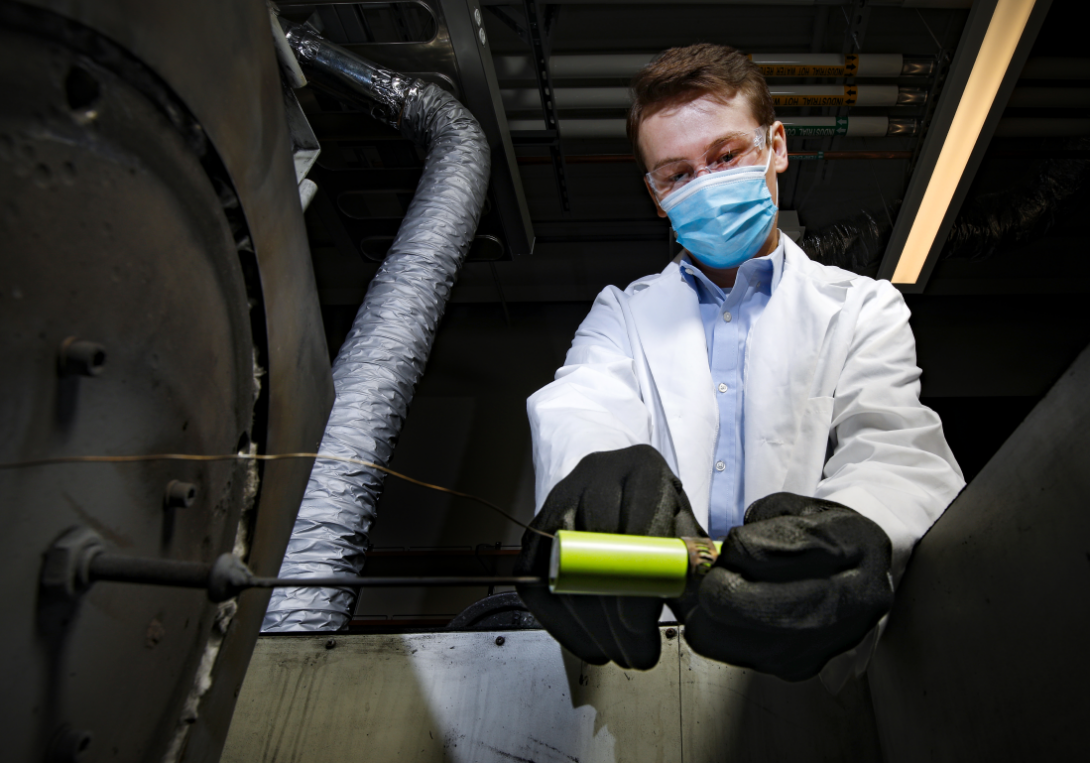Student-facilitated public-private partnership to improve battery safety

Text block one Heading link
Since their invention in the 1980s, lithium-ion batteries have powered some of our most advanced technologies, including smartphones and electric cars. They also are crucial in expanding the use and scale of renewable energy. Still, they remain prone to fires and other safety incidents that scientists are struggling to prevent.
A public-private partnership between UIC’s College of Engineering and AllCell Technologies, a Chicago-based company that designs and manufactures lithium-ion battery packs, hopes to help solve these safety issues and improve energy storage.
Chemical engineering PhD student Samuel Plunkett has been in the middle of the collaboration for years. His PhD research, advised by Associate Professor Brian Chaplin and Visiting Research Professor Said Al-Hallaj and conducted in conjunction with Argonne National Laboratory, focuses on electrochemical analysis of novel cathode materials for lithium-oxygen batteries. In addition to being a UIC student, Plunkett is a senior research development engineer at AllCell, which Al-Hallaj co-founded.
Plunkett grew up in Australia and attended the University of Newcastle for his undergraduate degree. He noted that Australia’s energy is provided almost entirely by coal and that Newcastle is one of the largest ports for coal exportation in the world.
“The majority of the practical engineering problems we covered were focused on coal processing and mining,” Plunkett said. “I wasn’t exposed to renewable energies until my final year capstone research project, where I collaborated with a professor who was working on making biodiesel from sugar cane and other leftover biomass.”
The renewable energy research experience lit a fire in Plunkett’s mind, and he decided he wanted to pursue doctoral research in the emerging green-energy sector. After his acceptance to UIC, Plunkett contacted professors who study renewables and connected with Al-Hallaj. Plunkett started an internship at AllCell in 2018.
Al-Hallaj encouraged other students to follow in Plunkett’s footsteps and seek internships or industry experience during their graduate or undergraduate studies: early on, and more often.
“Sam has been an outstanding engineer and researcher and has provided necessary leadership skills to move this project in the right direction,” Al-Hallaj said. “I believe that working with AllCell has provided him with an invaluable hands-on industry experience to complement his academic and R&D strengths.”
Text Block two Heading link

Now three years into the experience, Plunkett helped to lead research that shed light on a battery failure mechanism in lithium-ion batteries due to current dumping that is caused by catastrophic failure of one of the cells in the pack.
Like a string of holiday lights that completely goes out when one bulb fails, each battery is made up of different cells that are connected to power the battery, Plunkett explained. When one cell experiences an internal short circuit, other cells connected in parallel also experience a short circuit. That can generate substantial internal heat, leading to failure in each of the neighboring cells.
In addition to explaining this phenomenon, the paper demonstrates that catastrophic cell failure of this type can be isolated to prevent thermal runaway propagation or fire. The method includes AllCell’s phase change composite technology in combination with proper cell mechanical fusing.
“Cells are going to fail on the manufacturer’s side, or they are going to get damaged or overheated or overcharged,” Plunkett said. “When a cell fails in your battery pack, you can contain that, but you can’t contain hundreds or thousands of cells failing. For example, if one cell in a Tesla electric car goes off, a driver may hear a little pop and get a warning signal to get to a service station and that’s it. But if the whole thing goes up, there goes your car—and life if you don’t get out in time.”
Plunkett and his colleagues published their observations in the Journal of Applied Energy in a paper titled, “Enhancing thermal safety in lithium-ion battery packs through parallel cell ‘current dumping’ mitigation.”
Al-Hallaj said the research is part of the Game Changer Battery Challenge at the U.S. Department of Energy’s National Renewable Energy Laboratory, sponsored by Shell. AllCell is filing patent applications based on the work, he added.
To measure and characterize how lithium-ion batteries can be efficient and effectively store energy, AllCell also recently collaborated with UIC mechanical and industrial engineering Professor Reza Shahbazian-Yassar and his Nano Engineering Lab.
Al-Hallaj said working with researchers such as Shahbazian-Yassar and his team is important for startups such as AllCell to stay ahead of the curve. It also offers the company a chance to recruit top-level talent.
“The new partnership is a way for AllCell to combine expertise between its own internal understanding and Dr. Shahbazian-Yassar’s capabilities,” Plunkett said. “Professor Shahbazian-Yassar is pushing the envelope in terms of battery chemistry and material characterization. We are trying to corner the market on safety. This partnership will help us to maintain our development in battery technology.”